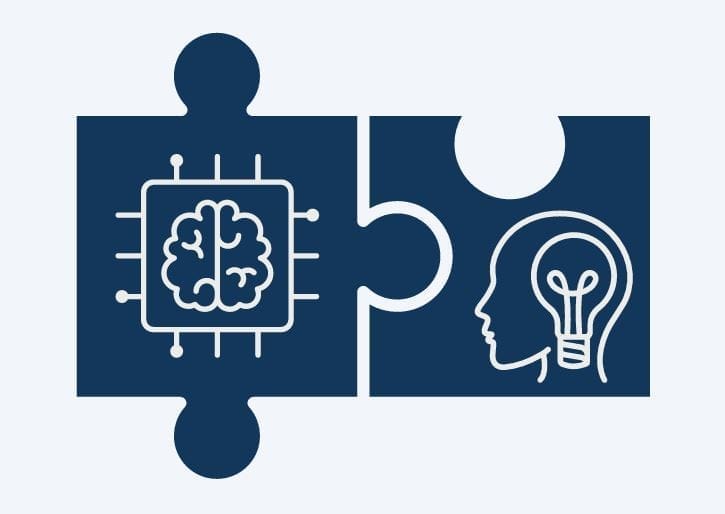The 4 Skills That Will Future-Proof Your Career in the Age of AI 🤖✨
AI won’t take your job - but someone who understands it might.
Sounds like a cheeky warning, right? But it’s a reality we all need to face.
The job market is shifting faster than ever, and if your skills don’t keep pace, you risk being left behind.
Whether you’re just starting out or looking to level up, there are four essential skills that will help you not just survive but thrive in the age of AI.
1. Digital Mindset — Understand AI, Don’t Just Fear It 💡

First things first: AI is not some mysterious boogeyman waiting to snatch your job.
It’s a tool - a very powerful one - that’s changing how we work.
But here’s the catch: it’s not about being a programmer or a tech wizard (unless you want to be!). It’s about developing a digital mindset: knowing what AI can do, where it shines, and where it falls short.
For example, AI is brilliant at automating repetitive tasks like data entry, sorting emails, or even generating first drafts of reports.
But it doesn’t have common sense, empathy, or creativity in the human sense. So your job? Learn to use AI with a critical eye. Try out tools like ChatGPT or AI-based data analysers in your daily tasks. Experiment with prompts. Don’t just accept what AI gives you - refine, question, and improve it.
2. Subject Matter Expertise — Go Deep in a Domain 📚🔍
AI can crunch numbers and generate content, but it lacks deep context and nuanced understanding.

That’s where you come in. To stand out, pick a field you’re passionate about - be it marketing, healthcare, finance, logistics - and become an expert.
Think of it like this: AI can help a marketing team by analysing trends, but it can’t replace a marketer who truly understands consumer psychology or brand storytelling.
The same goes for healthcare professionals who combine medical knowledge with empathy, or finance experts who interpret market shifts with insight.
Dive deep into your chosen domain. Take courses, seek mentors, volunteer for projects. The more you know, the more invaluable you become, because you’re the one guiding AI to do the right things.
3. Continuous Learning: Stay Curious and Agile 🚀📖

AI isn’t standing still - and neither should you. The landscape is evolving rapidly, with new tools, apps, and methods popping up all the time. If you think your degree or training is ‘enough’ forever, think again.
Develop a habit of lifelong learning. Follow AI news, join online workshops, pick up micro-courses on relevant skills.
For example, if you’re in supply chain management, learn how AI tools can predict disruptions. If you’re a designer, experiment with AI-powered creative platforms.
Being curious and agile keeps you one step ahead. It’s like surfing a wave - if you stop paddling, you fall off.
4. Critical Thinking — Don’t Let AI ‘Rot Your Brain’ 🧠⚡️
AI can produce answers fast, but not always right. It might hallucinate facts or show biases you don’t expect.
This is why critical thinking is crucial.

When you use AI, question everything. Does the output make sense? Are there sources cited? Could you add nuance or correct errors?
For instance, if an AI writes a client proposal, review it thoroughly. Add your insights, tailor the tone, and ensure accuracy.
This skill sets you apart. It transforms you from just a consumer of AI to a savvy user - someone who leverages technology but doesn’t blindly follow it.
Why These Skills Matter More Than Ever 🕰️

AI is excellent at tasks but terrible at context and strategy. That means the human edge today is about insight, adaptability, and problem-solving. not just punching the clock.
Picture the old career pyramid - lots of entry-level jobs feeding into fewer expert roles. AI is flattening that base by automating routine tasks.
So, the way to climb the ladder is by building skills that AI can’t replicate. The more you combine tech savvy with deep expertise and sharp judgement, the more valuable you become.
How to Develop These Skills in Practice 💪
Use AI tools daily: Whether it’s generating ideas, automating tedious work, or analysing data, practice makes perfect.
Specialise: Pick a niche that excites you and commit to mastering it.
Build learning habits: Subscribe to newsletters, attend webinars, take quick online courses.
Challenge AI outputs: Don’t just accept the first draft. Edit, fact-check, and add your unique perspective.
Wrapping Up 🎁
The jobs of tomorrow will go to those who master these four skills today. AI isn’t here to replace you, it’s here to be your co-pilot. And the best pilots? They know their tools inside out and fly with both heart and head.
So, what’s your experience with AI in your career? Are you already using some of these skills, or is this all new?
I’d love to hear your stories, insights, or questions - drop a comment below! 👇
ABOUT
Helping young professionals identify their career direction, develop their skills, and achieve their professional aspirations.
QUICK LINKS







